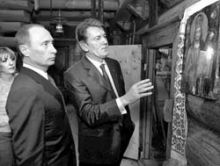As Vladimir Putin was visiting Ukraine, it transpired that the “Single Economic Space” idea did not belong to Russia. Mr. Putin said so in Kyiv. During President Viktor Yushchenko’s visit to Moscow in January, it was stated that the Kremlin had been complying with the previous Ukrainian leadership’s requests. All statements to the effect that both sides have settled their bilateral issues are nothing new, nor are they to be trusted.
The general impression from Vladimir Putin’s one-day visit to Kyiv is that the Russian leader wanted to see Viktor Yushchenko to settle certain matters before the Ukrainian president’s trip to Washington; also perhaps to figure out which of the key Ukrainian political figures, Yushchenko or Tymoshenko, should be approached to settle such sensitive issues; to make several largely meaningless statements that could be later referred to as instrumental in establishing effective bilateral contacts. Both sides, claiming that there are no problems to be resolved, have led the general public astray. There are issues still to be solved, which both presidents have mentioned, including marine borders, free trade, oil and gas supplies, aircraft construction, and other issues that are being kept away from the public eye. Take the Tuzla provocation; what Russian spin doctors were doing in Ukraine; what Yanukovych, Vitrenko, and Korchynsky were doing in Moscow in the aftermath of the presidential campaign in Ukraine; or the readmission agreement providing for adequate border protection on both sides. What about undertaking effective joint economic projects and keeping them transparent? What went wrong with the consortium that was supposed to manufacture a modern cargo plane based on the AN-70 model? Also, issues relating to the deployment of the Russian Navy on the Black Sea, including ground infrastructures, can hardly be described as totally resolved, considering that the Russians appear to be de facto masters of Sevastopol, and so on.
One thing Mr. Putin made perfectly clear in Kyiv was Moscow’s firm skeptical attitude toward Ukraine’s European integration. He repeated what has been asserted time and again in Moscow: the European Union will never admit Ukraine, not even as a candidate member, meaning that Ukraine has only one alternative: close cooperation with Russia, and that Russia will in turn build a “common economic space” with the EU. Moscow, it should be noted, is discussing this possibility with a degree of confidence indicating the presence of contacts between the Russian leadership and EU officials after the Orange Revolution in Ukraine. The allegation that Ukrainian-Russian cooperation doesn’t contradict the European integration process is nothing new either, especially considering that it has a variety of implications.
Thus, no one so far has answered such questions as: “What particular tasks can be solved by the creation of the Single Economic Space? Why is it impossible to do without this incomprehensible alliance? What about expert findings and feasibility studies? Why should Ukraine move toward Europe following Russia’s lead? How can all sides benefit from this (save for what is generally known here as “moral satisfaction” for those who refuse to accept Ukraine as a state)?” The creation of a Yushchenko- Putin commission may prove to be a good move in the right direction, although the initiative doesn’t seem to originate from Russia. Another good move was President Yushchenko receiving his Russian counterpart at home.
Ukraine diplomatically says that it is all for the “Single Economic Space” (to quote Premier Yulia Tymoshenko) — but only as a “free trade zone” (e.g., President Viktor Yushchenko). Also, Serhiy Teriokhyn was appointed Minister of Economy; the man is well versed in matters relating to foreign trade, financial process, and stock exchange vehicles responsible for Ukraine’s participation in the creation of this organization. It is also true, however, that there is no indication of its clout with regard to the documents and accords mentioned by Mr. Teriokhyn’s predecessor Mykola Azarov. We don’t know what these documents are all about and how Ukraine can benefit — or suffer — from them. The overall impression is that the new Ukrainian leadership simply wanted smoothly to eradicate a possible base for the Ukrainian opponents (recently in power) by general statements and diplomatic contacts. If so, the results aren’t bad at all for starters.
There will, of course, be problems relating to serious issues, such as the long-suffering gas transportation consortium (Western interests involved in it are apparently once again being welcomed by Russia), Odesa-Brody’s reverse mode, and discarding the policy of allowing Russian companies to monopolize the Ukrainian oil market, complying with AN-70 obligations, and achieving true free trade status.
More problems will emerge if Ukraine confronts conflicts of security interest in terms of obligations to Russia and NATO, if a situation develops in which not only a crucial choice must be made, but also effective vehicles must be activated to protect our national interests. Steps might also have to be taken, considering the tangible presence of Ukrainian capital in Russia and in order to protect it.
All told, the Russian president’s visit to Ukraine looked ill-prepared. Mr. Putin appeared to have a very vague idea of what is going on in Ukraine and what he should expect. Viktor Yushchenko, meanwhile, looked fully prepared psychologically. However, neither side appears to have a concept of bilateral relations in a friendly international context. So far Ukraine has the hard-won initiative, but putting it to good use may prove difficult if and when the new Ukrainian government starts arguing about control over the “Russian vector.” The first signs of intrigue are already there. The news that the Putin-Yushchenko Commission will be routinely supervised by the National Security and Defense Council of Ukraine obviously disappointed the cabinet in general and the prime minister in particular.







